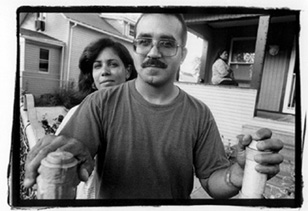Alejandro Hernandez

Alejandro Hernandez (Photo: Loren Santow)
Police perjury and jailhouse snitch testimony put Alejandro Hernandez on death row
Alejandro Hernandez, Rolando Cruz and Stephen Buckley were wrongfully convicted and sentenced to death for the 1983 kidnaping, rape, and murder of 10-year-old Jeanine Nicarico in DuPage County, Illinois.
Prior to their 1985 trial the lead detective in the case resigned in protest that prosecutors were proceeding against innocent men. Nonetheless, prosecutors continued and won convictions, thanks to the testimony of officers who falsely claimed that Cruz had told them details of the crime that only the killer would have known. Shortly after the trial, a repeat sex offender and murderer — Brian Dugan — confessed that he alone had committed the crime, as well as a series of other crimes, including two rape-murders and three rapes.
Many of these crimes were similar to the crime for which Hernandez and Cruz were sitting on death row, and several witnesses established conclusively that Dugan was the sole perpetrator in the other crimes he had described. Although Dugan's confession that he alone killed Jeanine Nicarico was corroborated by overwhelming evidence — as shown by a Chicago Lawyer investigation headed by Rob Warden — prosecutors steadfastly refused to acknowledge that they had put the wrong men on death row. And, after the Illinois Supreme Court reversed the convictions, prosecutors retried Hernandez and Cruz and again won — largely because much of the evidence proving that Dugan had committed the crime was excluded from the courtroom.
In 1990, a volunteer legal team led by Lawrence C. Marshall agreed to represent Cruz on appeal. After four years of arduous litigation, the Illinois Supreme Court reversed Cruz's conviction in 1994, and granted him a third trial. Prior to that trial, newly available DNA testing excluded Hernandez and Cruz as the child's rapists and linked Dugan to the crime. Even so, prosecutors refused to drop the case.
At trial, Cruz was represented by a team of four lawyers, including Marshall. During the trial, a police officer admitted that he had lied under oath in relation to testimony about Cruz's purported statement. After hearing all of the prosecution's evidence, the trial judge directed a verdict of not guilty. Prosecutors later dropped charges against Hernandez. The story of the Cruz-Hernandez case is told in a book by Thomas Frisbie and Randy Garrett — Victims of Justice, Avon Books (1998).
In the aftermath of the Cruz trial, a special grand jury indicted four sheriff's deputies and three former prosecutors for their roles in the Cruz case. Charges included perjury and obstruction of justice. Although a DuPage County jury acquitted these men of those charges, the County later agreed to pay $3.5 million to settle the civil rights claims that Cruz, Hernandez, and Stephen Buckley (a third defendant who had been charged in the crime) had filed in federal court.
Case Summary (pdf)

